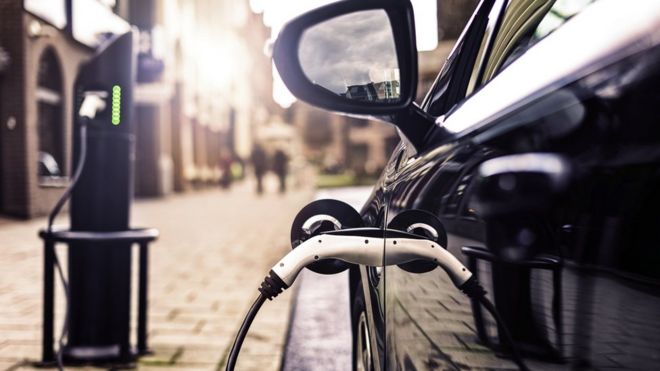
Fears that electric cars could actually increase carbon emissions are a damaging myth, new research shows.
Media reports have questioned if electric cars are really “greener” once emissions from manufacture and electricity generation are counted.
The research concludes that in most places electric cars produce fewer emissions overall - even if generation still involves fossil fuels.
Other studies warn that driving overall must be reduced to hit climate targets.
The new research from the universities of Exeter, Nijmegen - in The Netherlands - and Cambridge shows that in 95% of the world, driving an electric car is better for the climate than a petrol car.
The only exceptions are places like Poland, where electricity generation is still mostly based on coal.
Lifetime emissions
The researchers say average “lifetime“ emissions from electric cars are up to 70% lower than petrol cars in countries like Sweden and France (where most electricity comes from renewables and nuclear), and around 30% lower in the UK.
They say the picture for electric cars will become steadily more favourable as nations shift to clean electricity.
The study projects that in 2050 every second car on the streets of the world could be electric. This would reduce global CO2 emissions by up to 1.5 gigatonnes per year, which is equivalent to the total current CO2 emissions of Russia.
The progress could be much faster if nations adopt stricter targets, as the UK has done by pledging that every new car sold will be zero emissions by 2035 at the latest.
The study’s lead author, Dr Florian Knobloch from the University of Nijmegen said: “The idea that electric vehicles could increase emissions is a complete myth.
“We've seen a lot of discussion about this recently, with lots of disinformation going around.
“We have run the numbers for all around the world, looking at a whole range of cars and even in our worst-case scenario, there would be a reduction in emissions in almost all cases..”
Problem not solved
But that doesn’t mean the problem of cars and the environment is solved. First, it’ll be hard to shift the car fleet to electric in time to meet the UK’s 2050 climate goal.
Second, the process will put a huge strain on the generation and supply of clean energy.
And third, abrasion of electric car tyres and brakes will still create pollution in cities.
Prof Greg Marsden, from the Institute for Transport Studies at Leeds University, warned: “Electrification is necessary but not enough.
“Travel demand reductions of at least 20% are required, along with a major shift away from the car if we are to meet our climate goals.
“This implies a really major social change. That is why it is a climate emergency and not a climate inconvenience.”
The new study also looked at electric household heat pumps and found they, too, produce lower emissions than fossil-fuel alternatives in 95% of the world.
The researchers carried out a life-cycle assessment in which they not only calculated greenhouse gas emissions generated when using cars and heating systems, but also in the production chain and waste processing.
In 53 of 59 global regions – including all of Europe, the US and China – the findings show electric cars and heat pumps are already less emission-intensive than fossil-fuel alternatives.


0 Comments